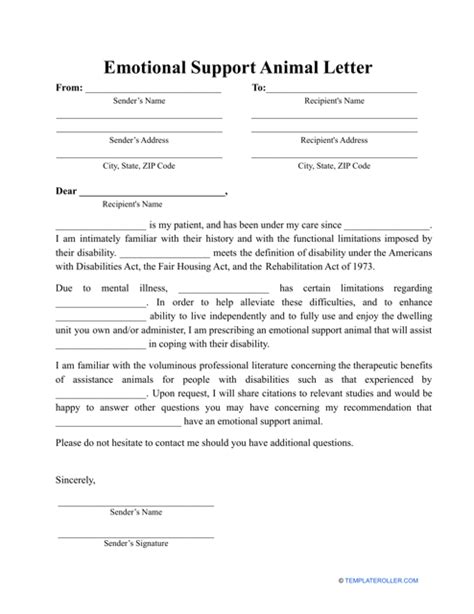Life can be wonderfully unpredictable, but it can also throw us curveballs that challenge our mental and emotional well-being. For many, navigating these challenges feels like walking a tightrope, especially when dealing with conditions like anxiety, depression, PTSD, or other mental health struggles. In these moments, the comfort, companionship, and unwavering support of an animal can be nothing short of miraculous. This is where the concept of an Emotional Support Animal (ESA) comes into play – a lifeline for those who find solace and stability in the presence of their beloved companions.
Perhaps you've heard whispers about ESAs, or maybe you've felt that deep, intuitive connection with your own pet and wondered if they could officially become your "emotional support animal." You might have even typed "free printable ESA letter template" into your search bar, hoping for a simple, immediate solution. Trust me, I understand that impulse. I remember a time when I was trying to navigate a complex administrative process myself, feeling overwhelmed by jargon and unclear pathways. All I wanted was a clear, direct answer, a template to follow, a simple "fill-in-the-blanks" solution to an emotionally draining problem. The desire for a straightforward "printable template" often comes from a place of vulnerability and a longing for clarity in what feels like a murky system.
This comprehensive guide is born from that very human need for clarity, empathy, and accurate information. It's designed to cut through the confusion, debunk myths, and provide you with a compassionate, step-by-step roadmap to understanding, legitimately obtaining, and living harmoniously with your emotional support animal. We'll explore everything from the legal landscape to practical daily tips, ensuring you’re equipped with the knowledge to make informed decisions and find the support you deserve.
Table of Contents

- [Understanding Emotional Support Animals (ESAs): More Than Just Pets, They're Partners in Healing](#understanding-emotional-support-animals-esas-more-than-just-pets-theyre-partners-in-healing)
- [The Truth About "Free Printable ESA Letter Templates": What They Are (and Aren't)](#the-truth-about-free-printable-esa-letter-templates-what-they-are-and-arent)
- [Navigating the Legal Landscape: Your Rights and Protections with an ESA](#navigating-the-legal-landscape-your-rights-and-protections-with-an-esa)
- [Finding the Right Professional: How to Secure a Legitimate ESA Evaluation](#finding-the-right-professional-how-to-secure-a-legitimate-esa-evaluation)
- [Anatomy of a Valid ESA Letter: Essential Components and Best Practices](#anatomy-of-a-valid-esa-letter-essential-components-and-best-practices)
- [Your Step-by-Step Journey: Approaching Your Healthcare Provider for an ESA Letter](#your-step-by-step-journey-approaching-your-healthcare-provider-for-an-esa-letter)
- [Common Pitfalls to Avoid: Protecting Yourself from ESA Scams and Invalid Letters](#common-pitfalls-to-avoid-protecting-yourself-from-esa-scams-and-invalid-letters)
- [Living with Your ESA: Practical Tips for Housing, Travel, and Public Life](#living-with-your-esa-practical-tips-for-housing-travel-and-public-life)
- [Beyond the Initial Letter: Maintaining Your ESA Status and Ongoing Support](#beyond-the-initial-letter-maintaining-your-esa-status-and-ongoing-support)
- [Real Stories of Comfort and Connection: The Profound Impact of Emotional Support Animals](#real-stories-of-comfort-and-connection-the-profound-impact-of-emotional-support-animals)
- [How to Choose the Best Path for Your ESA Letter Needs](#how-to-choose-the-best-path-for-your-esa-letter-needs)
- [Advanced Tips for Experts: Navigating Complex ESA Scenarios](#advanced-tips-for-experts-navigating-complex-esa-scenarios)
- [Conclusion: Embracing Your Journey to Emotional Well-being](#conclusion-embracing-your-journey-to-emotional-well-being)
---
Understanding Emotional Support Animals (ESAs): More Than Just Pets, They're Partners in Healing
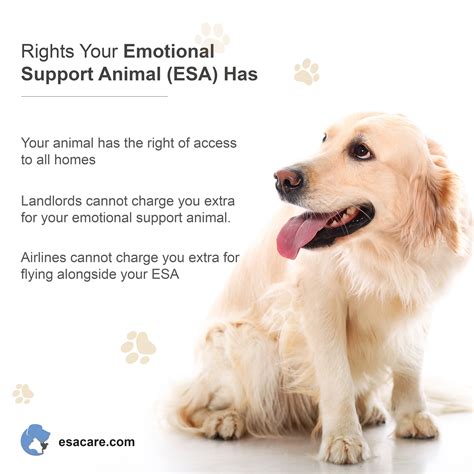
Let's start at the very beginning. What *is* an Emotional Support Animal? It's not just a pet you love dearly, though that love is certainly a foundational piece of the puzzle. An ESA is an animal that provides companionship, comfort, and emotional stability to an individual with a mental or emotional disability. Unlike service animals, which are specifically trained to perform tasks for individuals with disabilities (think guide dogs for the visually impaired), ESAs don't require specific training. Their therapeutic presence *alone* is what qualifies them.
The key distinction lies in the *therapeutic benefit* they offer. For someone struggling with severe anxiety, the gentle purr of a cat or the comforting weight of a dog on their lap can avert a panic attack. For a veteran with PTSD, the consistent, non-judgmental presence of their animal can ground them in moments of distress. These animals provide a unique form of support that medication or traditional therapy alone might not fully address.
### Key Aspects of ESAs:
- Purpose: To provide emotional comfort and support, alleviating symptoms of a mental or emotional disability.
- Legal Basis: Primarily recognized under the Fair Housing Act (FHA) and historically, the Air Carrier Access Act (ACAA) for air travel (though ACAA rules changed significantly in 2021).
- No Specific Training Required: Unlike service animals, ESAs do not need specialized training to perform specific tasks. Their presence is the therapeutic intervention.
- Any Animal Can Be an ESA: While dogs and cats are most common, other animals like birds, rabbits, or even miniature pigs have served as ESAs, provided they don't pose a direct threat to the health or safety of others and do not cause substantial property damage.
- Documentation is Key: The *only* way an animal becomes a legally recognized ESA is through a legitimate letter from a licensed mental health professional (LMHP). This letter must state that the individual has a mental or emotional disability recognized in the Diagnostic and Statistical Manual of Mental Disorders (DSM-5), and that the animal is necessary for their mental health.
Think of it this way: your ESA isn't just a beloved companion; they're an integral part of your mental health treatment plan, prescribed by a professional. This distinction is crucial because it underpins all the legal protections and responsibilities associated with having an ESA. When my friend Sarah was struggling with agoraphobia, her therapist suggested an ESA. Sarah was initially skeptical, but the idea of having her small dog, Pip, by her side, a constant, comforting presence, gave her the courage to start venturing out more. Pip wasn't trained to open doors or fetch medication; his mere presence was the therapy, slowly helping Sarah reclaim her life. This highlights the profound, yet often subtle, impact an ESA can have.
The Truth About "Free Printable ESA Letter Templates": What They Are (and Aren't)
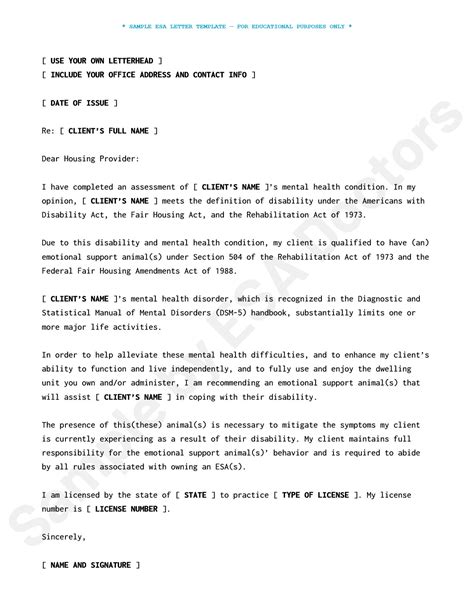
Okay, let's tackle the elephant in the room: the phrase "free printable ESA letter template." When you search for this, what are you *really* hoping to find? Most likely, you're looking for a quick fix, a document you can just download, fill out, and present as your official ESA letter. Here's the critical truth: A legitimate ESA letter cannot be self-generated or simply downloaded and filled out by you.
The internet is rife with websites offering "instant ESA letters" or "ESA registration" for a fee, often claiming you just need to print a form. These are almost universally scams. There is no national registry for ESAs, and a letter downloaded from a random website, without a legitimate evaluation by a licensed mental health professional, holds absolutely no legal weight.
### What a "Template" *Could* Legally Be (and Why It's Misleading):
1. A Guide for LMHPs: A "template" might exist as a guideline for licensed mental health professionals on what to include in an ESA letter. This is a framework for *them* to use, not for you.
2. A Sample Letter: You might find samples online demonstrating what a valid ESA letter looks like. These are for informational purposes *only* and are not meant to be copied and submitted.
3. A Scam: Most commonly, sites offering a "free printable ESA letter template" are trying to trick you into paying for a worthless document or signing up for a subscription service that provides no legitimate professional evaluation.
The danger here is significant. Presenting an invalid ESA letter can lead to denial of housing, denial of travel (where applicable), fines, and even legal repercussions. Landlords and airlines are becoming increasingly savvy about identifying fraudulent ESA documentation. Imagine the heartbreak of finally finding an apartment that accepts pets, only to be denied because your "ESA letter" isn't legitimate. My own cousin almost fell for one of these scams when he was trying to find housing. He was desperate and saw an ad for an "instant ESA letter." Thankfully, a friend intervened and told him to pause, reminding him that something so important couldn't be so easily obtained. That moment of caution saved him a lot of potential grief and money.
The takeaway: Your focus should not be on finding a "free printable ESA letter template" to fill in yourself. Your focus should be on connecting with a licensed mental health professional who can assess your condition and, if appropriate, issue a *legitimate, personalized ESA letter* on their official letterhead. The letter itself is the product of a medical evaluation, not just a document to be templated.
Navigating the Legal Landscape: Your Rights and Protections with an ESA

Understanding the legal framework behind Emotional Support Animals is paramount. Unlike service animals, which are generally covered by the Americans with Disabilities Act (ADA) in public spaces, ESAs primarily fall under different legislation. This distinction is vital for understanding where your ESA is protected and where it might not be.
The two primary pieces of legislation that historically provided protections for ESAs are:
1. The Fair Housing Act (FHA): This is the cornerstone of ESA housing rights. The FHA prohibits discrimination in housing based on disability. Under the FHA, housing providers (landlords, HOAs, co-ops) must make "reasonable accommodations" for individuals with disabilities, which includes allowing an ESA even if they have a "no pets" policy. They cannot charge pet fees or deposits for an ESA, as it's considered an assistive aid, not a pet. They can, however, charge for damages caused by the animal.
- Key Points for Housing:
- Reasonable Accommodation: The accommodation (allowing the ESA) must be necessary for the person with a disability to use and enjoy their dwelling.
- Disability Nexus: There must be a direct link between the person's disability and the animal's function in alleviating symptoms. This is where the LMHP's letter comes in.
- Direct Threat/Undue Burden: Housing providers can deny an ESA if the animal poses a direct threat to the health or safety of others, or would cause substantial physical damage to the property, or if the accommodation would impose an undue financial and administrative burden. This is rare but possible.
- Verification: Housing providers can request verification of your disability and the need for an ESA through a legitimate letter from a licensed mental health professional. They *cannot* ask for details about your disability or demand that the animal perform specific tasks.
2. The Air Carrier Access Act (ACAA): This act historically allowed ESAs to fly in the cabin with their owners for free. However, major changes occurred in January 2021. The Department of Transportation (DOT) revised its rules, stating that airlines are no longer required to accommodate ESAs. This means airlines can treat ESAs as regular pets and apply their standard pet policies, including charging fees and requiring them to fly in a carrier in cargo or under the seat. Some airlines may still choose to accommodate ESAs, but it is entirely at their discretion. Service animals, however, are still protected. This change has caused considerable confusion and heartbreak for many ESA owners who relied on their animals for air travel. Always check with your specific airline well in advance of travel.
### Other Contexts:
- Public Access: Unlike service animals, ESAs generally do *not* have public access rights. This means you cannot typically bring your ESA into restaurants, shops, public transportation (other than what's allowed for pets), or workplaces that don't allow pets.
- Workplace Accommodation: While not explicitly covered by the FHA or ACAA, the Americans with Disabilities Act (ADA) *could* potentially apply to ESAs in the workplace as a "reasonable accommodation." However, this is a much more complex and less clear-cut area than housing. It requires a direct discussion with your employer and often a detailed letter from your LMHP explaining the necessity. Each case is evaluated individually, and employers can deny if it poses an undue hardship.
Understanding these legal nuances is crucial. Don't rely on online rumors or outdated information. Always consult official government resources (HUD, DOT) or a legal professional specializing in disability rights if you have specific questions. I once had a client who assumed her ESA could go anywhere a service dog could, leading to an awkward situation at a restaurant. A quick, empathetic conversation about the difference between ESAs and service animals, and the specific laws governing each, helped her understand the boundaries and avoid future misunderstandings. Knowledge truly is power when it comes to advocating for your rights and your animal's role in your life.
Finding the Right Professional: How to Secure a Legitimate ESA Evaluation
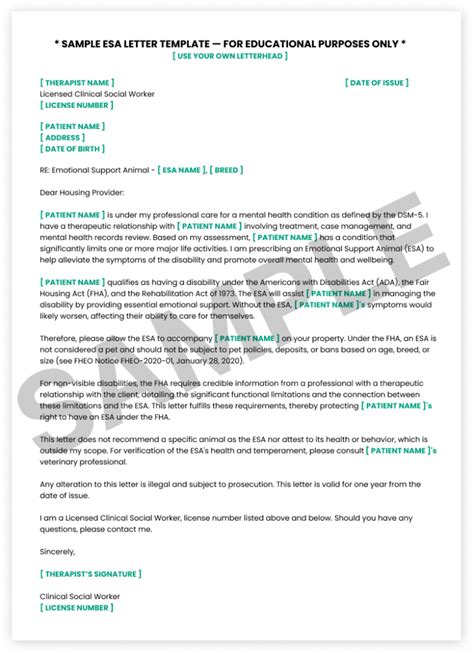
This is arguably the most crucial step in the entire process. Without a legitimate evaluation and a letter from a qualified, licensed mental health professional (LMHP), your animal is simply a pet, not a legally recognized ESA. The emphasis here is on legitimate and licensed.
### Who Can Issue an ESA Letter?
An ESA letter must come from a licensed mental health professional (LMHP) who is treating you for a mental or emotional disability. This includes:
- Psychiatrists (MDs): Medical doctors specializing in mental health, who can prescribe medication.
- Psychologists (Ph.D./Psy.D.): Professionals trained in psychotherapy and psychological assessment.
- Licensed Clinical Social Workers (LCSW): Professionals who provide counseling and therapy.
- Licensed Professional Counselors (LPC/LPCC): Qualified to provide mental health counseling.
- Psychiatric Nurses: Advanced practice nurses specializing in mental health.
Important Note: The professional must be licensed in *your state* and have a therapeutic relationship with you, meaning they are actively involved in your mental health care. They can't just write a letter after a five-minute phone call.
### Pathways to Finding an LMHP:
1. Your Existing Therapist/Doctor:
- The Ideal Scenario: If you already have a therapist, psychiatrist, or even a primary care physician who manages your mental health, this is your best first step. They already understand your medical history and mental health needs.
- Approach: Schedule an appointment specifically to discuss your mental health symptoms and how your animal helps alleviate them. Be prepared to articulate the specific ways your animal provides support.
2. Referral from Your Primary Care Physician (PCP):
- If your PCP doesn't feel comfortable writing an ESA letter themselves (some might, some won't), they can refer you to a mental health specialist who can.
3. Online Telehealth Services (with Caution):
- The digital age has brought many legitimate telehealth platforms that connect you with licensed professionals for therapy and evaluations. These can be convenient, especially if you live in a rural area or have mobility issues.
- Vetting is Crucial: This is where many scams hide. When using an online service, ensure:
- Licensed Professionals: Verify that the professionals are licensed in your state. Most reputable sites will clearly display this information.
- Real Evaluation: There must be a genuine, in-depth consultation (video call, extended phone call) where the professional assesses your condition. It cannot be a questionnaire and a quick email.
- Transparency: Reputable services are transparent about their fees, the evaluation process, and what their letters *do* and *do not* cover. They won't promise "instant approval."
- No "Registries": Beware of any site that emphasizes "ESA registration" or "certification." These are not legitimate requirements.
- My Subjective Tip: I personally prioritize transparent communication and verifiable credentials when choosing a mental health professional, whether in person or online. Always look for clear evidence of their license and read reviews, especially regarding how they handle ESA evaluations.
### What to Avoid:
- "ESA Registries" or "Certifications": These are purely commercial ventures and have no legal standing. Your animal does not need a vest, ID card, or a spot on a database to be an ESA.
- Websites Promising Instant Letters: A legitimate evaluation takes time and professional judgment.
- Professionals Who Don't Ask Questions: If a "professional" offers to write a letter without a thorough assessment of your mental health condition and how an ESA specifically mitigates your symptoms, it's a red flag.
- "Free Printable ESA Letter Template" Sites that Offer to *Sell* You a Letter: As discussed, a template is not a legitimate letter.
Finding the right professional is an act of self-advocacy. It requires patience and diligence, but securing a legitimate letter is the only way to ensure your rights and your animal's status are properly recognized. This isn't just about getting a piece of paper; it's about establishing a therapeutic relationship that genuinely supports your well-being.
Anatomy of a Valid ESA Letter: Essential Components and Best Practices
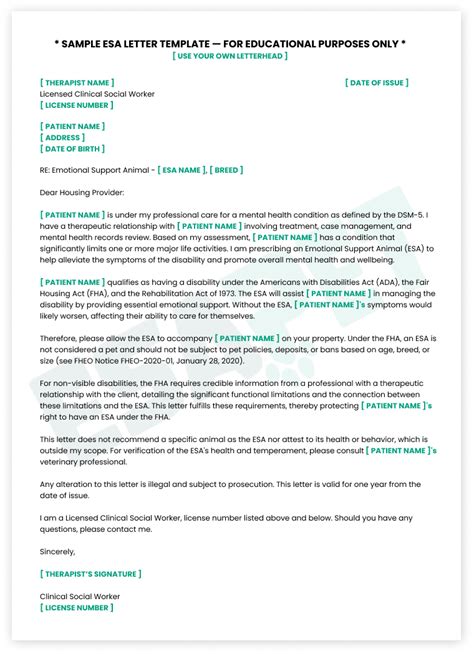
Once you've connected with a legitimate licensed mental health professional (LMHP), they will be responsible for drafting your ESA letter. While there's no single, universal "free printable ESA letter template" that's legally mandated, there are specific components that every valid letter *must* include to be taken seriously by housing providers and (if applicable) airlines.
Here's what your legitimate ESA letter should contain, serving as a comprehensive checklist for both you and your LMHP:
1. Professional Letterhead: The letter must be printed on the official letterhead of the licensed mental health professional or their clinic/practice. This immediately lends credibility.
2. Date of Issuance: The letter should be current, typically issued within the last 12 months. Some housing providers might request an updated letter annually, though this isn't universally required by law.
3. LMHP's Full Name and License Information: This is non-negotiable. The letter must clearly state the professional's full name, their type of license (e.g., "Licensed Clinical Social Worker," "Psychologist," "Psychiatrist"), and their license number.
4. LMHP's Contact Information: Their professional address, phone number, and email address should be included. Housing providers may contact the LMHP to verify the authenticity of the letter, though they cannot ask for details about your disability.
5. Confirmation of a Disability: The letter must state that you have a mental or emotional disability that is recognized by the DSM-5 (Diagnostic and Statistical Manual of Mental Disorders). The LMHP *does not* need to disclose the specific diagnosis, only that you have a qualifying disability.
6. Confirmation of Need for an ESA: This is critical. The letter must explicitly state that the emotional support animal is necessary for your mental health, providing therapeutic benefits that alleviate one or more symptoms of your disability. It should explain the "nexus" – the connection between the animal and your ability to function.
- *Example phrasing:* "Ms. Smith's anxiety symptoms are significantly alleviated by the presence of her emotional support dog, Rover, which provides a calming and grounding presence during moments of distress."
7. Recommendation for an ESA: The LMHP should clearly recommend an emotional support animal as part of your treatment plan.
8. No Specific Animal Identified (Usually): Generally, a valid ESA letter does not need to identify the specific animal by name, breed, or type. It states the *need* for an emotional support animal. This allows for flexibility if, for example, your current ESA passes away and you get another. However, if you are seeking accommodation for a specific animal, it's often helpful (though not legally required) for the letter to mention "an emotional support animal, specifically a dog/cat/etc."
9. Professional Signature: The letter must be signed by the licensed mental health professional.
10. State of Licensure: The LMHP should indicate the state(s) in which they are licensed to practice. This confirms they are legally permitted to issue such a letter for you in your location.
### Best Practices for Your LMHP:
- Conciseness: While comprehensive, the letter should be concise and to the point, avoiding overly technical jargon or unnecessary details about your specific disability.
- Clarity: The language should be clear and unambiguous, leaving no doubt about the animal's status as an ESA and its necessity.
- Focus on Function: The letter should focus on how the animal *functions* to mitigate the symptoms of your disability, rather than just stating you have an animal.
Remember, this letter is your key to securing reasonable accommodation. It's a formal document, and its validity hinges on the legitimacy of the professional who writes it and the inclusion of these essential elements. My friend, a therapist, shared with me how often she sees poorly written or incomplete "templates" from other sources. She always ensures her letters are comprehensive and include every single one of these points, because she knows it protects her clients and their ESAs.
Your Step-by-Step Journey: Approaching Your Healthcare Provider for an ESA Letter
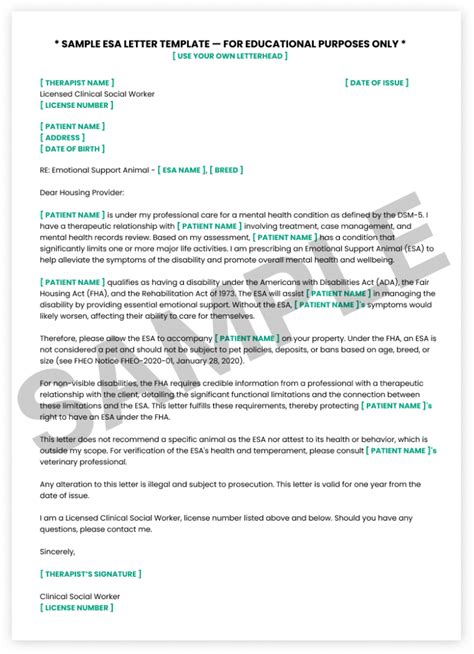
So, you're ready to explore the possibility of obtaining an ESA letter. This isn't just about asking for a document; it's about having an open, honest conversation with your healthcare provider about your mental health needs and how an animal fits into your treatment plan. Here’s a compassionate, step-by-step guide to help you navigate this important discussion:
1. Self-Reflection and Preparation (Before the Appointment):
- Understand Your Needs: Clearly identify your mental or emotional disability (e.g., anxiety, depression, PTSD, panic disorder) and how it impacts your daily life.
- Identify the Role of Your Animal: Think specifically about how your current or desired animal helps alleviate your symptoms. Be concrete.
- *Example:* "My anxiety often leads to panic attacks, but when my dog, Max, lays on my chest, his weight helps ground me and calm my breathing."
- *Example:* "My depression makes it hard to get out of bed, but knowing I need to feed and walk my cat, Luna, gives me a reason to start my day and provides a sense of purpose."
- *Example:* "During moments of emotional overwhelm, petting my rabbit, Thumper, provides a tactile distraction and lowers my heart rate."
- Research: Familiarize yourself with ESA laws (especially the Fair Housing Act) so you can discuss them knowledgeably if needed.
- Organize Your Thoughts: It might be helpful to jot down notes or bullet points to ensure you cover everything you want to say during your appointment.
2. Scheduling the Appointment:
- If you have an existing therapist or psychiatrist, schedule a regular therapy session or a dedicated appointment to discuss this.
- If you're seeking a new professional, be upfront about your interest in exploring an ESA during your initial contact. This ensures they are comfortable and experienced with such evaluations.
3. During the Conversation (Be Open and Honest):
- Initiate the Discussion: Start by explaining your current mental health challenges and the symptoms you experience.
- Explain Your Animal's Role: Share your self-reflection points about how your animal provides specific, therapeutic support. Emphasize the *necessity* of the animal for your well-being, not just that you enjoy having a pet.
- Be Patient: Your LMHP might ask detailed questions to fully understand your situation. This is a good sign; it means they are conducting a thorough evaluation. They might ask about:
- The history of your mental health condition.
- How long you've had your animal (if applicable).
- Specific instances where your animal has helped you.
- Your living situation and why an ESA is necessary there.
- Discuss the Legalities (Briefly): You can mention your understanding of the FHA and how an ESA letter is the required documentation for housing accommodation.
- Be Prepared for "No": It's possible your professional might not agree that an ESA is appropriate for your specific diagnosis or treatment plan. Respect their professional judgment. They might suggest alternative therapies or approaches. It's also possible they don't feel qualified to write an ESA letter and might refer you to another professional.
4. Follow-Up and Documentation:
- If your LMHP agrees to write a letter, confirm what information they need from you (e.g., your landlord's contact information, if applicable).
- Ask for an estimated timeframe for when the letter will be ready.
- Once received, check the letter carefully against the "Anatomy of a Valid ESA Letter" checklist to ensure all necessary components are present. Keep both a digital and physical copy in a safe place.
Remember, this is a collaborative process between you and your healthcare provider. Your goal is to help them understand the profound, therapeutic bond you share with your animal and why their presence is integral to your emotional well-being. My neighbor, Alex, who lives with chronic anxiety, told me how nervous he was to bring up the idea of an ESA to his new therapist. But by preparing his thoughts and explaining clearly how his cat, Whiskers, helped soothe his panic attacks, the conversation flowed naturally, and he walked out feeling heard and supported. It’s a testament to the power of open communication and thoughtful preparation.
Common Pitfalls to Avoid: Protecting Yourself from ESA Scams and Invalid Letters

The journey to obtaining a legitimate ESA letter can feel complex, and unfortunately, this complexity has created a breeding ground for scams and misinformation. Protecting yourself means understanding what to look out for and how to avoid common mistakes that can lead to invalid documentation or wasted money.
Here are the most common pitfalls and red flags you absolutely must avoid:
1. **"Instant" or "Guaranteed" ESA Letters/Regist
